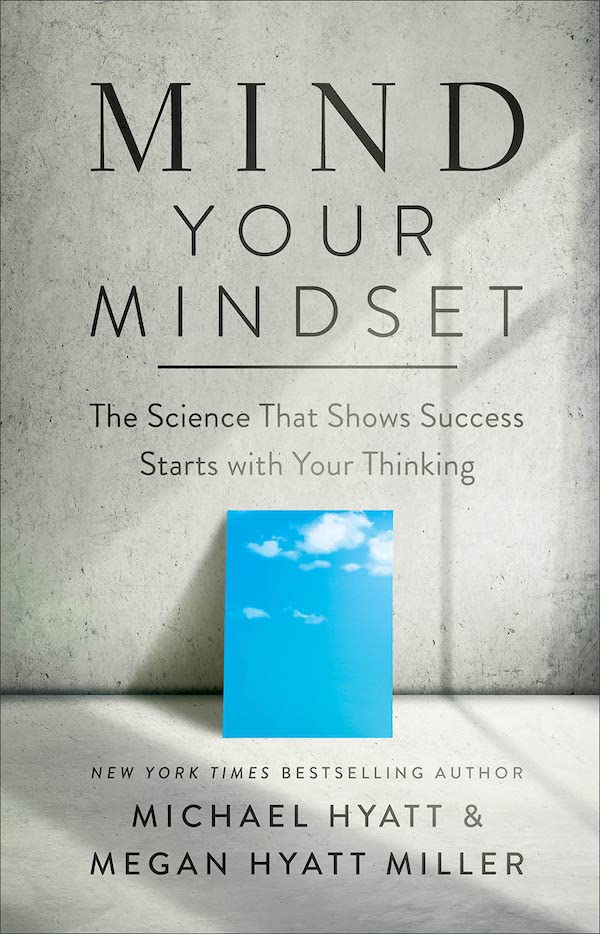Tue, 14 March 2023
 A tidy sanctuary creates mental space to find calm more readily. Upon walking into my home, Le Papillon, knowing and then witnessing that it has been cleaned, tidied and unnecessary items have been removed, whether that be emptying the recycling basket in the boot & basket room (aka mudroom), countertops are cleared of extraneous items, and the flowers are fresh, I breathe some of the deepest breaths I ever take during my days. Distractions to the mind come into our lives in a variety of ways (I share and discuss 11 forms of distraction here), and one such way is clutter of items in our homes, items without a home, too many items, dusty, dirty, disorganized spaces, counters, windows, fabrics, floors, etc. No doubt, I am not sharing anything you don't already know. But how do we tend to our homes and still have time and energy to live the lives we want to live? I will admit to being nearly totally in alignment with Simone Beauvoir's train of thinking shared in her book The Second Sex when it comes to house cleaning, “Few tasks are more like the torture of Sisyphus than housework, with its endless repetition: the clean becomes soiled, the soiled is made clean, over and over, day after day.” And if there was a magic wand to wave whenever the house needed its regular clean and tidy, I would wave it without hesitation regularly and often. I recognize that some may find calm in the practice of cleaning, and that is fine; however, what would you do if your house was perpetually clean? Think of all the time and energy you would have remaining to do something constructive, explore a curiosity, read a book, rest your eyes after a long, grueling, yet productive week, spend more time with those you love, spend more time in your own company getting to know yourself better, take a longer walk with the pups, snuggle with your cat who is seeking your company after having been at the office all day. I share the possibilities of what we might choose to do with more time, regular time consistently available, to point out that while cleaning and caring for our homes is a necessity, there are many different approaches to doing so well to gain the benefits of such a space that is our sanctuary. Apart from hiring a regular cleaning service which I have done in the past and may do again in the future, even if they come every other week, or weekly, we still can care for our homes thoughtfully as well as simply in order to enjoy all of the time we find ourselves in our abode. And regarding the choice to focus on a small household, this can be viewed in two ways: whether small in square footage or living with only a couple of inhabitants (our furry companions count as family here on TSLL). So whether you live on your own as I do, with dogs or cats or entirely in your own company, with your partner, or are an empty-nester, living in a small household liberates us in multiple ways, and thankfully, requires less to clean and care for, giving us more time and energy to do so well. One of the chapters in my second book, Living The Simply Luxurious Life: Making Your Everydays Extraordinary and Discovering Your Best Self, goes in to great detail about “Living Small”, chapter 13, and one such reason is the reality that the smaller the space we call home, the less we have to clean. However, just because we may live, choosing to or not, in a small home doesn't mean the home can't be luxurious. In decoration, in organization, in consideration for everything, we can live luxuriously in a small home, and the beauty is, we have an advantage, we have less to clean, less to furnish, less to organize, now we just have to figure out how to do so wisely and with great savvy. Back in 2011 I shared a brief post detailing what to clean and how often throughout the year in our homes, pairing with the post a free printable PDF of this cleaning schedule, but it was brief and that was more than 10 years ago, so with the prompting from a TSLL reader recently who shares her home with her husband and pets, sans children (similar to myself, sans the husband), I wanted to update and share with you how to clean and maintain your home throughout the year so that when Spring does roll around you don't feel overwhelmed by the 'spring cleaning' fever that often arises. And I completely get it. It feels good to freshen up the entire house, but I don't have the time and energy to do so all in one swoop once a year. Rather, what makes sense to me is a steady, smart approach both in how and what I clean and maintain to avoid large repair bills due to lack of attention. Let's take a look at the list, and I will provide again, but this time the updated version, the free printable PDF schedule at the end of today's post/episode.
1.Begin with a home and its contents that you actually use and need In other words, this is a one off, not a regular practice, but something to keep in the back of your mind after you tend to it when considering bringing in new items to the home. Ask yourself the following question: “The stuff you own has to help you create the life you want. And if it doesn’t, why is it in your home?” –Peter Walsh As I look around my own home, small in square footage but large to the eye with its high ceilings and multiple south-facing windows letting in oodles of light, I will tend to this question room by room throughout the year. Honestly, nothing is on a schedule now when it comes to this permanent editing as I have edited quite a bit over the past four years with my move to my home and with the construction over the past three years. For example, my kitchen cupboards and drawers received a thorough edit during the kitchen remodel when everything was removed and stored in my guest bedroom. Nothing says, reduce and eliminate the unnecessary when you have no more floor space in your guest bedroom to put anything. Do I really need that [insert item that I have never used, not once, ever]? Below is a list of space, collections and items to seriously look at and judiciously edit:
Now that you have clarity that you either have what you need, or know what you need and have let go of the rest, you have let go of some stress, alleviated some unwanted burdens on your ability to relax when you arrive home and are ready to more swiftly and intentionally clean your home regularly without it becoming overwhelming, and maybe even a bit enjoyable. ☺️
2. Daily simple habits that reduce the amount of weekly and monthly cleaning When we are at the point of burn-out even the simplest task of picking up after ourselves can be taxing. I can remember more nights than I want to admit while I was both teaching and blogging that I was too tired to entirely pick up the kitchen after cooking dinner before I went to bed. I literally needed more energy and going to bed was a necessity over cleaning the kitchen. Don't worry, I would without fail, clean the kitchen in the morning, but that was a task that didn't help to begin the day well. Stepping into a clean kitchen, a clean home each morning is a wonderful way to start the day and I knew that, but I did not have the energy to make it my regular practice on certain days of the work week. All of this built up to show me that I needed to make a change, so I share all of that with you to acknowledge, you may have an extremely busy schedule, so much so you cannot tend to these tasks listed below each day, but when you do make the necessary breathing room in your life to tend to these habits daily, it has a beautiful ripple effect of reducing stress, increasing clarity and giving you the ability to make better, more constructive decisions so that you never find yourself in such a schedule again.
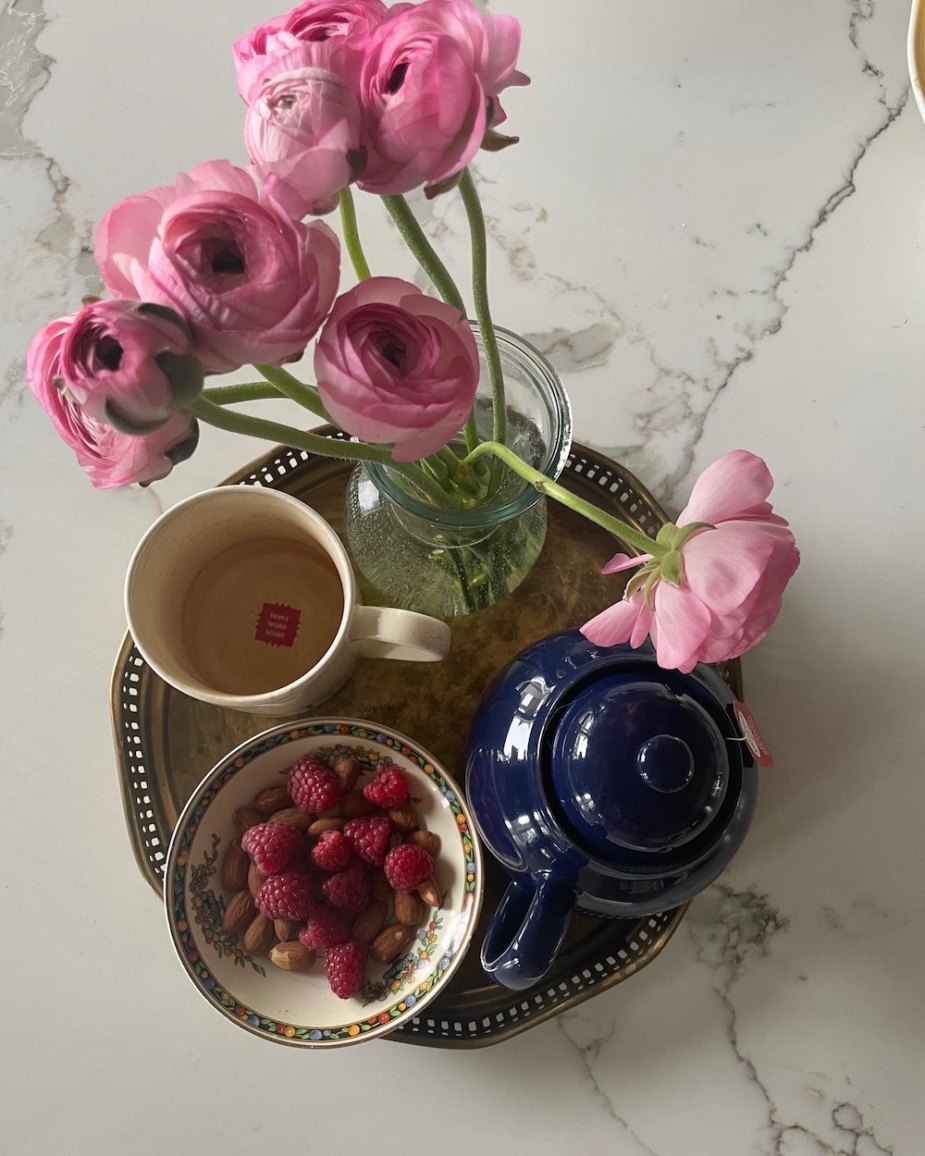 Okay, so what are the daily habits? In order of the day's events:
3. Choose one day during the week, an afternoon or morning (early or late), that you can designate 1-2 hours to clean Now, again, I am not someone who enjoys cleaning, and when I used to write this task in my planner, I sighed a bit because I would have rather been doing something else, prior to retiring from teaching, it would have been just having more time to relax at my home, now it is time to create, to explore, to be with my pups without a vacuum or a cleaning rag/mop in my hand. However, #3 on this list is a be a misnomer because you don't have to do all of the same cleaning tasks each day of the week, rather you are going to alternate a few. Let me explain. It was an aha moment for me the first time I hired a cleaning service to regularly clean my house: they came every other week. And I thought to myself, how can I possibly wait two weeks to have my house cleaned? After all, for years I had attentively cleaned my house each Friday after work, no matter what I was up to later the evening or how long my week had been. Well, what I discovered was that if you clean it well every other week AND tend to the daily habits shared above, your house will be just fine, and you will be less stressed and have more free time. What to do each week (every other week tasks designated as such):
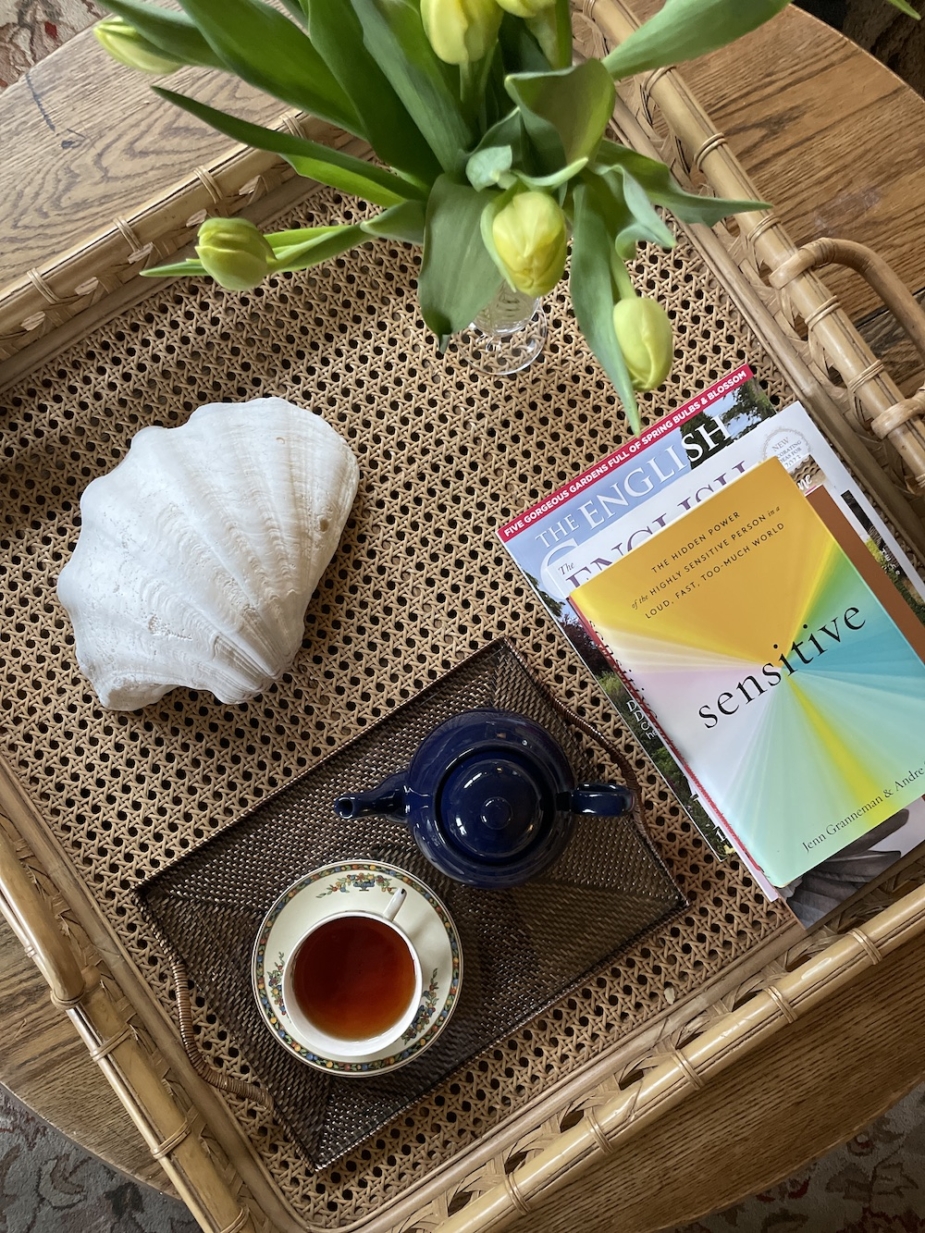
4. Quarterly/every 3 months/Seasonally Many of the items on this list will come from tasks shared in #3 that don't need to be done as often depending upon how you live, or need to be done more frequently that are listed below in #5.
5. Twice a Year, during a day or couple of days that you have energy, so ideally after a day you have been able to rest One time of year I tend to many annual or semi-annual tasks is during the week between the years, that final week of the year when I am able to have time to myself and just rest, then be energized to tidy up which always feels good upon going into a new year. Here's the list:
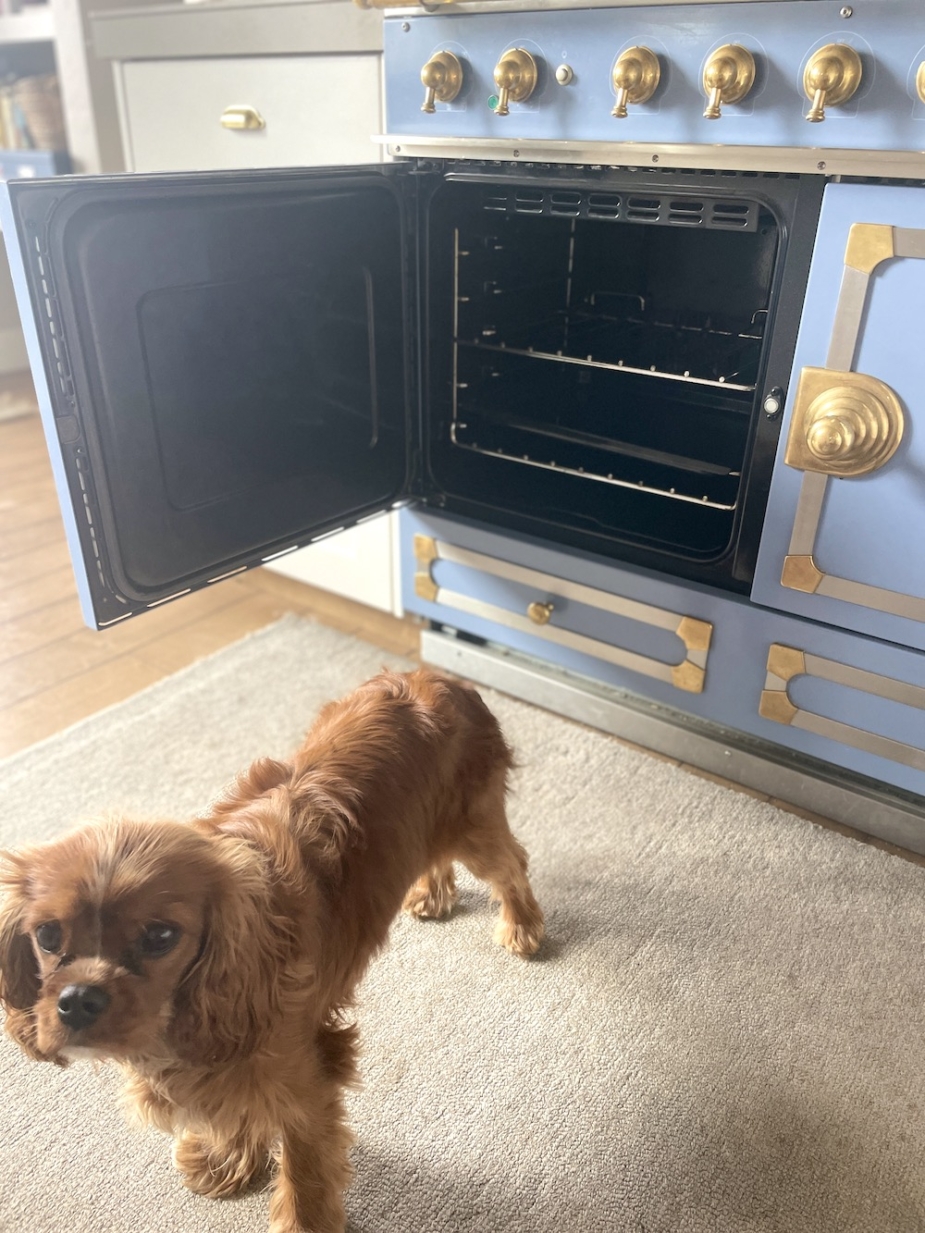 ~Nelle was my helper cleaning the interior of my stove recently. Learn more about why I chose Le Cornue for my stove here.~ ~Nelle was my helper cleaning the interior of my stove recently. Learn more about why I chose Le Cornue for my stove here.~
6. Yearly as the time is right on the calendar/season for each task and your schedule The yearly tasks will be dependent upon your home, climate, and other variables, but whenever you tend to what you need to, choose a time that works with your schedule, budget and the best time of year to tend to this task, if it requires, for example, you to be outside.
Phew! Okay, just looking back at this list may seem like a tremendous amount; however, when what you are taking care of are items and spaces in your home that bring you comfort, calm and repose, it becomes motivating to keep them at their best which is why I began with #1. When we remove what feels like a burden because we never use it, it simply takes up space or holds memories we don't want to revisit, then tidying up does become more of a chore. Once #1 has been taken care of, and you spread out all of these tasks over a year, it actually isn't that bad at all. In fact, while compared to the list I wrote in 2011, this list is quite extensive, due to the fact that I have a far smaller house (nearly half the size) than I did when I wrote the previously list, all that I do is far less and done far better which ensures that I can space out the time between tasks or when I do them more frequently, not have that much work to do. Compiling this list occurred on a wonderfully rainy day here in Bend which gave me much time to reflect on a year's worth of responsibilities, but also, as I wrote each one, I was also expressing gratitude, thankful to have a home to care for well. Which leads me to my final idea for creating more enjoyment of the task of caring for our homes, why not name your home? I know it may sound silly at first, but when we humanize the space that gives us life, safety, security, comfort, nurtures love and care, it reminds us that is more than four walls and in a way, a part of our 'family' so to speak, and that too helps in providing an internal motivation to care for it well. And with that to ponder, wishing you a wonderful start to a brand new season with Spring’s arrival next Monday, the 20th. 😌 ~Click here for the free PDF TSLL Cleaning & Home Maintenance Schedule~ ~Learn more about the benefits of becoming a TOP Tier Member.
SIMILAR POSTS/EPISODES YOU MIGHT ENJOY
10 Ideas for Reveling in the Spring Season, episode #325 
Petit Plaisir —Palais des Thé's Herboriste (herbal/tisane) Thés

|
Tue, 28 February 2023

"It's not a matter of luck or magic. This is simply how your brain works. So take a break every now and then, and let your brain do what it does best."—Michael Hyatt & Megan Hyatt Miller, authors of Mind Your Mindset: The science that shows success starts with your thinking One of the Beatles most (of many) famous songs came to Paul McCartney simply upon waking up in the morning. As he did, at the age of 21, he was humming a tune that initially he titled "Scrambled Eggs", is better known as "Yesterday" (source). The founder of Ikea, Ingvar Kampard, came up with the concept that lays at the foundation of the now internationally recognized company - "modular furniture makes home decor more accessible", when while working at a furniture store, a customer who had purchased items for their home could not fit it into their car and had to disassemble the legs from the table in order to drive it home (source). And if you ever wanted to thank the person who made it easy and fuss-free to have your caffeine boost in the morning, thank German Melitta Bentz who, tired of "percolators prone to over-brewing coffee, espresso-type machines leaving grounds in the drink, and linen bag filters being tiresome to clean" came up with the drip coffee machine using "blotting paper from her son’s school notebook". Patented in 1908, her grandchildren continue to head the "Melitta Group KG with some 3,300 employees in 50 companies" all for a simple idea that no one had thought so simple before: patented under the title “Filter Top Device Lined with Filter Paper”(source). Aha Moments can pertain to any number of areas of our world and lives. Yes, they may prompt us to come up with a promising business idea, much like Sara Blakely and Spanx, but more often, aha moments are seemingly out-of-nowhere discoveries that pop up in our minds that give us clarity, insight and/or direction about something that speaks to our true self. Webster's dictionary underscores and elongates the enumeration of what we are gifted with in such moments: a moment of sudden realization, inspiration, insight, recognition, or comprehension. And I don't know about you, but these moments, these Aha Moments with a capital "A" and "M", are a thrill to experience. The dopamine no doubt floods our minds and the joy and lightness in our step feels spontaneous. We figured it out! What ever the "It" might be. Who wouldn't want more of these moments? And the exciting news I want to share with you today is that you can cultivate an environment - i.e. your daily life - to do just that. In a new book Mind Your Mindset, authors and husband and wife Michael Hyatt and Megan Hyatt Miller share neuro-science and psychology research that demonstrates the power of the stories we tell ourselves and accept. Mind you, not all the stories we tell ourselves are constructive, least of all always accurate, and so for a portion of the book, they examine and reveal how to change the stories in our mind to live a more fulfilling journey of discovery and success. Which brings us to Aha Moments.
In order to change the stories that are limiting us from realizing our full potential and experiencing all that life can be when we gather up our courage to engage fully and with our true selves, we have to rewire our neurons, and without getting too complicated, we have to start thinking new thoughts. The authors go on to explain that while oversimplified, the brain does have a division of left and right (even though, not physically divided as each communicates with the other, which is how Aha Moments can occur). Explained as the left side being the executive network side which guides our conscious self, "it thinks about what you tell it to"; the right side is the default network side which "loves novelty and creativity and operates largely in your subconscious". Understanding this construction and function of the brain is crucial to enabling more Aha Moments to be a part of our daily life. Why? "To find creative solutions to your problems you need to get this second part of your brain [the default network] into action. This vast network of slower-firing neurons is highly adaptable. It can be endlessly reconfigured to provide new thought and connections. Sure, this takes longer than using conscious thought [executive network], but it's highly effective." —Mind Your Mindset Which leads us to revealing the answer to the question: How to experience more Aha Moments in your life. Let's take a look at the list below. 1.Consciously choose to not be physically 'working' all the time. Often work is only deemed as work if we can see something changing physically - so physical labor, cooking, cleaning, drawing, writing, correcting papers, etc. However, even Leonardo da Vinci took regular moments, even days to not be physically working on The Last Supper, but that didn't mean he wasn't working. His mind was busily meandering, not necessarily being directed by his left brain, but giving space and time to just meander about all that he held in his subconscious, letting his right side of the brain gradually discover connections that on the surface might seem completely disparate.
2. Make time for tasks unrelated to the 'problem' and somewhat quotidian, give you full attention to what you are doing - in other words, mono-task From walking, to cooking, to eating a meal to savor, gardening, any task that requires your full attention that you can let yourself get lost in and thoroughly enjoy, but is unrelated to the dilemma or question you are trying to answer, engage in it regularly. Seemingly out of nowhere, ideas will arise, but not if we force them to, and while not every time, you are giving your subconscious space to move about because your left side of the brain is taking a break.
3. Exercise vigorously (I will let you define what vigorous is) The reason I include the adverb vigorously is because when you are fully engaged with your workout - a long run, a cycling class, a yoga class, climbing a wall, swimming at a swift pace - your mind is held in the present moment which actually lets your subconscious dance about, yep, wander and meander seemingly aimlessly, but what it (your subconscious) is actually doing is very helpful. You just need to give it space to do that work and the time to connect any dots that you, your conscious mind, cannot see or understand.
4. Take a nap I was going to include this idea in #2, but it is quite different in the sense of being conscience. Similar to a good night's sleep, taking a nap. You will wake up with sharper ideas and a clear mind. On the topic of a good, deep sleep (at least 7-hours), such a regular health habit is vital to being able to experience Aha Moments. As we know while we sleep, our brain is 'cleaned' of toxins, certain thoughts are moved to long-term memory while others are swept away or taken deeper into the subconscious as deemed unnecessary for the conscious tasks we regularly tend to. There are many people, myself included, who go to sleep at night with a question about a particular situation and wake up with ideas anew for best approaching it, OR go to sleep with a worry and wake up having completely forgotten about it because the mind, based on our past experience and habits, deems it unimportant. Phew!
5. Prioritize Play In 2017 after reading Alex Soojung-Kim Pang's book Rest: Get More Done by Doing Less I was inspired to write episode #137 of the podcast and disspell the idea that we must always be 'doing' in order to live a fulfilling and even, dare I say, productive and successful life. What Pang points out, along with so much more is that rest need not be sitting on the sofa (although it can). Rest includes giving our mind (in this case, our left-side) a break and letting ourselves play, have fun, and return to many activities that we enjoyed as a child. In Dr. Mike Rucker's recent book The Fun Habit, he concludes, "If you want a twist of fate, start twisting. Choosing fun every day in small, seemingly superficial ways can, over time, lead to new patterns of behavior—new and better choices."
An Everyday Necessity: Deliberate Rest, episode #137 
6. Enjoy a 'Lazy' Weekend or Day Regularly One of the direct points addressed in Mind Your Mindset regarding stories is what or how we should live, and all of the ideas, in any culture, are rooted in stories we accept. So often the image is presented, at least it was to my generation in our youth by our parents and grandparents that sitting in front of the 'boob-tube' was akin to being lazy. Now don't worry, I am not advocating for plopping ourselves down regularly for hours and days and weeks on end mindlessly watching whatever, but sometimes, we need time to sit down on the sofa and just rest. To physically not move and peruse magazines, books, newspapers, watch something or having something on in the background, listen to podcasts endlessly, the latter two we may not really be paying attention to, but it creates an environment urging us to just be still. And when we are still, when we rest, when we are idle physically with no directive for our mind to attend to or a task to complete, the right side of the brain becomes quite happy and starts to make connections or attempts to make connections to see what might be possible. The authors in Mind Your Mindset suggest if you are trying to figure something out, you can point your mind in the direction you wish it to figure out, but then you let go. Let go and go about relaxing and toodling about with no objective in mind and what you are enabling is something quite constructive. So long as you do this regularly, your mind will begin to offer you ideas that seem initially as if they came out of nowhere, but you and I know differently. :)
Last but not least! 7. Feed your mind with a diverse serving of ideas and experiences The only way, unique and awesome Aha Moments can come to the forefront of your conscious mind is if you continue to remain curious about life. Since you were a child, you have been exposed to a vast breadth of ideas, objects, experiences, people and information. As an adult you have agency to choose to continue to explore new ideas, to deepen your learning, to see new places, experience new cultures, food and anything that is not part of what you already know (or think you know). By choosing to feed your mind with constructive nourishment, even if you don't know what you will do with the 'food' you receive, your subconscious holds on to these moments, and that is what it is dancing about with as you engage with each of the previous six ideas shared above. Which also means, mind what you feed your mind. Be conscientious about what you are exposed to, the information that swirls about, the words that are used, the attitudes, energy, etc. All of this will determine the quality of your life, and when you then make space to exercise your right-side of the brain, beautiful and what may have once seemed impossible discoveries will be made, and your life will change.
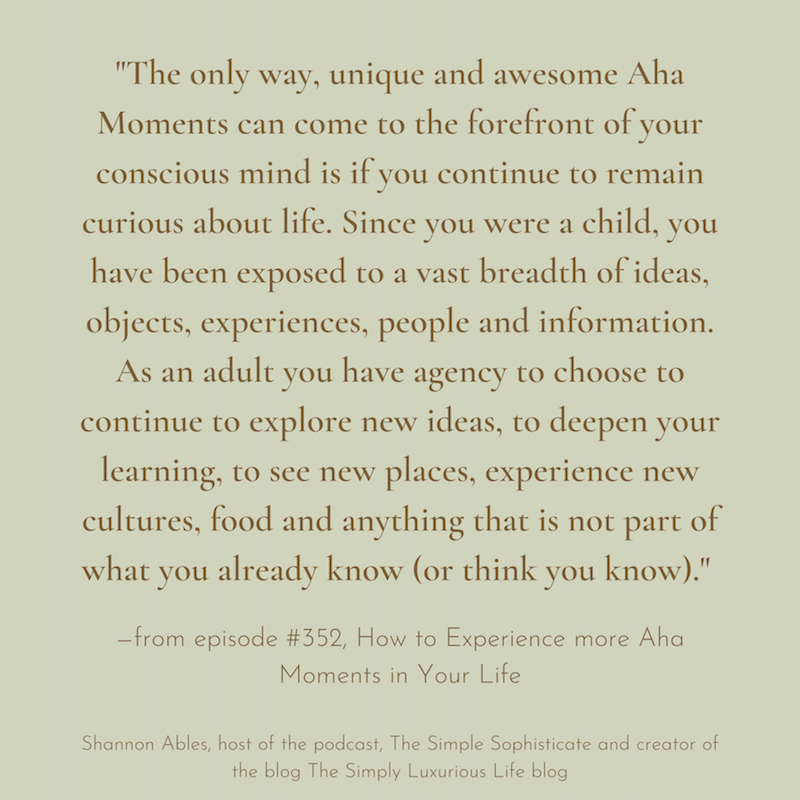 Wishing you many Aha Moments in your near and distant future.
Petit Plaisir

|
The Simple Sophisticate - Intelligent Living Paired with Signature Style

Categories
lifestylemoney
fashion
general
food
relationships
beauty
holidays
style
decor
etiquette
technology
dating
clothing
news
happiness
health
finances
self-help
feminism
french living
communication
inspiration
self-improvement
cooking
French-inspired
podcast
travel
entertaining
Archives
AprilMarch
February
January
December
November
October
September
August
July
June
May
April
March
February
January
December
November
October
September
August
July
June
May
April
March
February
January
December
November
October
September
August
June
May
April
March
February
January
December
November
October
September
August
July
June
May
April
March
February
January
December
November
October
September
August
July
June
May
March
February
January
December
November
October
September
August
July
June
May
April
March
February
January
December
November
October
September
August
July
June
May
April
March
February
January
December
November
October
September
August
July
June
May
April
March
February
January
December
November
October
September
August
July
June
May
April
March
February
January
December
November
October
September
August
| S | M | T | W | T | F | S |
|---|---|---|---|---|---|---|
| 1 | 2 | 3 | 4 | |||
| 5 | 6 | 7 | 8 | 9 | 10 | 11 |
| 12 | 13 | 14 | 15 | 16 | 17 | 18 |
| 19 | 20 | 21 | 22 | 23 | 24 | 25 |
| 26 | 27 | 28 | 29 | 30 | 31 | |
Syndication





